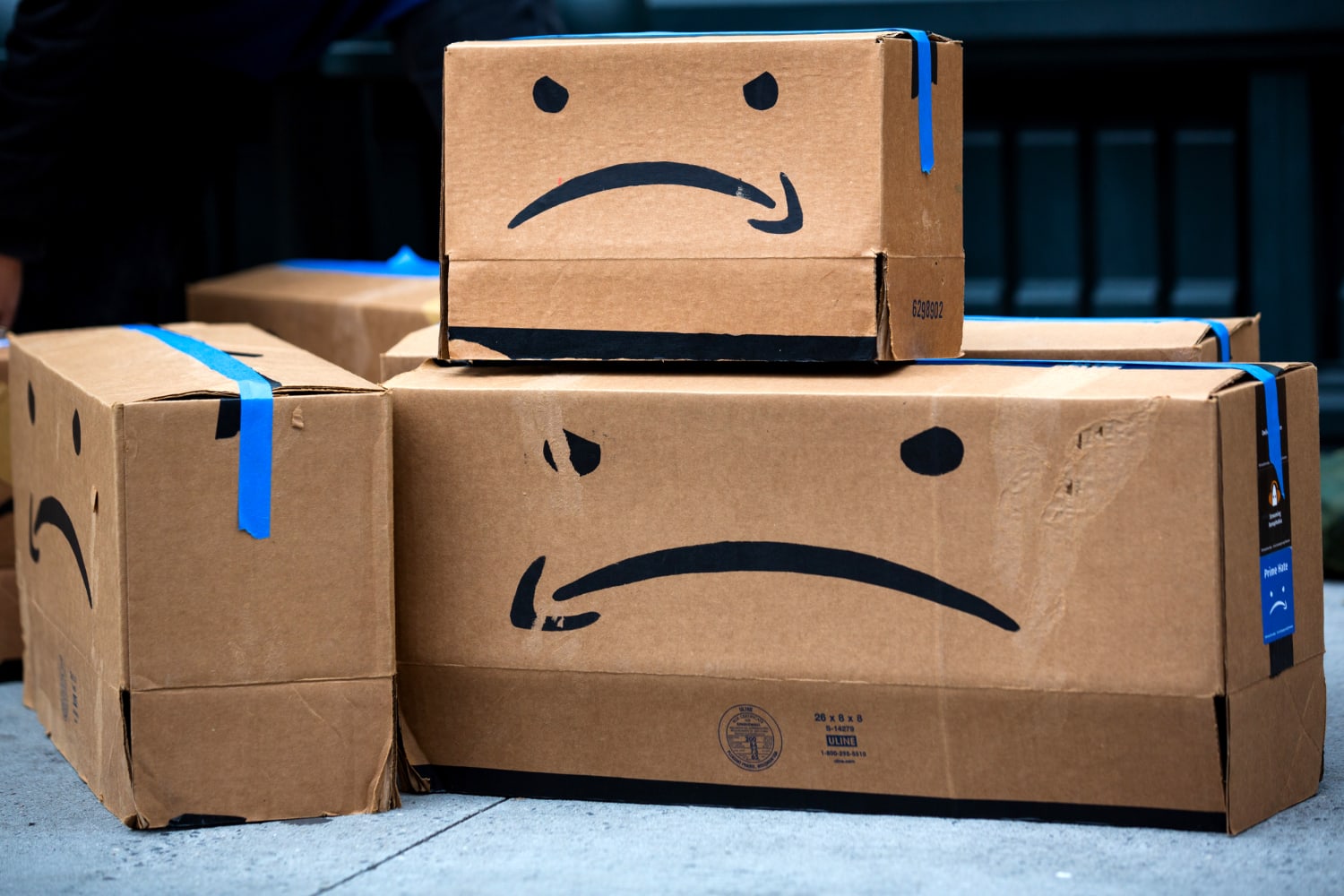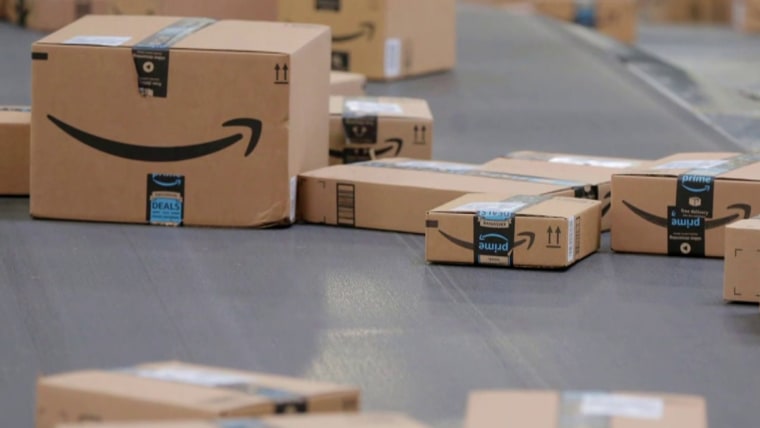Amazon has been one of the big corporate winners of the pandemic. In 2020, its revenue jumped by 38 percent, its profits soared by 84 percent, and the net worth of CEO Jeff Bezos grew by an astounding $75 billion. On Wednesday, the company announced a deal to purchase MGM for $8.5 billion, taking advantage of the film industry’s struggles over the same period. But a new lawsuit asserts Amazon’s success has come at the expense of third-party sellers and its own customers.
Platform companies like Amazon successfully turned the open web into a series of digital fiefdoms from which they are extracting an increasingly high price for access.
Despite the company championing “customer obsession” as its guiding principle, lawmakers in the United States and Europe have been investigating how it uses its monopolistic power to crush its competitors and extract value from everyone who depends on it.
On May 25, Washington, D.C., Attorney General Karl Racine filed an antitrust suit against Amazon alleging that it is using its contracts to prevent third-party sellers on its platform from offering their products anywhere else at lower prices than those on Amazon.
According to the lawsuit, Amazon controls 50 to 70 percent of all online retail sales in the U.S., so sellers cannot reasonably refuse the terms it offers. The filing estimates that the fees Amazon charges people to sell items on its site have risen by approximately 11 percent over the past five years, and now account for up to 45 percent of the price consumers pay when they buy a product from a third-party seller on Amazon.
Altogether, according to the lawsuit, “Seller fees now account for 21 percent of Amazon’s total corporate revenue.” Meanwhile, not only sellers, but also customers are getting squeezed by having to pay higher prices wherever they shop.
In a statement to NBC News, an Amazon spokesperson whose name was not disclosed, rejected the claims. “The D.C. attorney general has it exactly backwards — sellers set their own prices for the products they offer in our store.” The spokesperson stated that the lawsuit would “force Amazon to feature higher prices to customers, oddly going against core objectives of antitrust law.” However, the statement did not address the contractual requirement at the center of the attorney general’s allegations.
While Amazon has reaped the rewards of the pandemic, many people across the United States and the world have lost their jobs, fallen into poverty and been saddled with medical debt and even funeral expenses. Over that same period, the prices of essential goods have notably increased, placing additional pressure on people’s budgets.
Amazon has not helped.
In September 2020, the consumer advocacy group Public Citizen published a report on the price gouging that took place on Amazon early in the pandemic, with the price of some goods rising as much as 1,000 percent. The organization explained that while the company said it took measures to stop price gouging, those were not effective.
An Amazon spokesperson responded by saying that “there is no place for price gouging” on its platform, and that “our teams continue to monitor our store 24/7 and have already removed over a million offers.” But Public Citizen found the gouging was not just done by third-party sellers; some of Amazon’s own products showed significant markups.
Another report released by the U.S. Public Interest Research Group in January found that of the 750 products it tracked on Amazon, 409 had seen a price increase of more than 20 percent between December 2019 and December 2020, while 136 had doubled in price.
It’s important to note that this is not just an Amazon problem; it’s a worrying feature of the platform economy, in which massive online companies control the marketplace for service providers and customers.
As I explained for NBC News THINK last summer, go-to pandemic food delivery services such as Uber Eats and GrubHub have been accused of the same practices as Amazon. A proposed class-action lawsuit launched in April 2020 argued the services’ requirement that restaurants charge the same price in store as on the apps forced up food prices for everyone to account for the high fees charged by the app companies. The lawsuit is still moving through the court, and the food delivery companies have sought to have it dismissed.
Meanwhile, a similar argument is part of the ongoing lawsuit that Epic Games, the U.S. video game developer responsible for Fortnite, launched against Apple. Apple takes a 30 percent cut on app sales through the App Store and in-app purchases on the iOS operating system. Epic says that amounts to an “Apple tax,” where Apple leverages its monopoly on iOS to charge a high fee that developers and customers can’t avoid. Apple claims the fee is not an abuse of power, but necessary to maintain the privacy and security of iOS devices.
Platform companies like Amazon successfully turned the open web into a series of digital fiefdoms from which they are extracting an increasingly high price for access. Monash University researcher Jathan Sadowski calls this the “internet of landlords,” explaining that “we are now forced to deal with an explosion of landlords in our daily life — constantly paying rent, both in terms of money and data, for all of the different tools and services we use.”
Sometimes, the tolls these companies extract are visible to the consumer, like when Spotify tells iOS users they can save $3 on their monthly subscription if they sign up through the company’s website instead of the app to avoid the 30 percent fee charged by Apple.
But in other instances, that toll is invisible, and consumers never know the price they’re paying for goods and services is inflated because of growing fees being charged to sellers on Amazon or restaurants on food delivery apps.
As antitrust investigations and suits like Racine’s gain steam, Amazon continues to grow its control over the economy, as it has done during the pandemic.
This is just the beginning of the fight over whether platform monopolies should be allowed to use their intermediary positions to squeeze everyone who relies on their service. Racine’s antitrust suit is an important step in challenging these egregious practices, but ultimately Amazon’s power goes far beyond its ability to push favorable pricing terms on sellers.
As antitrust investigations and suits like Racine’s gain steam, Amazon continues to grow its control over the economy, as it has done during the pandemic, and expand its monopoly with major acquisitions such as Whole Foods in 2017 and now MGM. If governments are truly going to take on Amazon, they will need to get much more ambitious — and fast.
Source: | This article originally belongs to Nbcnews.com










